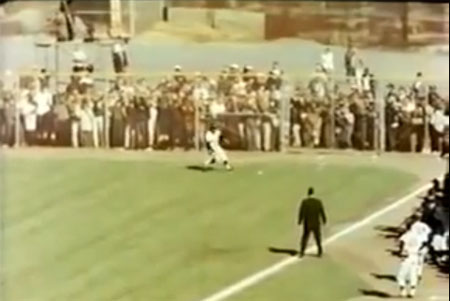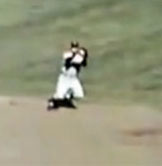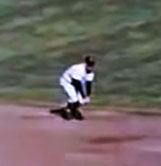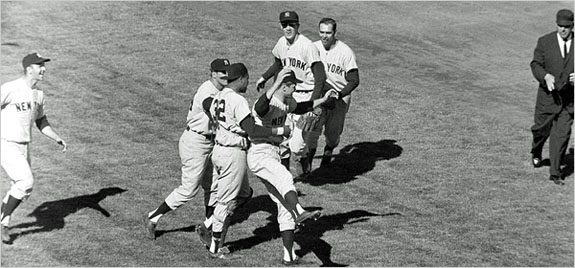|
Pivotal World Series Plays
Maris's Hustle and Richardson's Catch
1962 World Series Game 7: New York Yankees @ San Francisco Giants
The Series had been interrupted for five days between Games 5 and 6 because of rain in San Francisco. That allowed NY manager Ralph Houk to bring back his winning starter from Game 5, Ralph Terry, for Game 7. Terry had led the league with 23 wins.
The contest is arguably the greatest 1-0 game in baseball history.
Double Play Holds Yankees to One
No one gave it much thought in the top of the fifth when the Yankees loaded the bases with no one out, and Giants manager Alvin Dark had his infield play at double play depth. The strategy worked when Tony Kubek grounded into a 6–4–3 double play with Bill Skowron scoring from third. Jack Sanford then got 2B Bobby Richardson to foul out to limit the damage to one run.
Giants Miss Great Chance to Tie
Trying to get something started in the bottom of the 7th, 2B Chuck Hiller bunted the first pitch, but Terry speared it.
Mays smacked a liner toward the left field corner, but LF Tom Tresh raced to the line and made a one-handed "snow cone" catch to save an extra base hit.
Houk had a righty and a lefty, Bill Stafford and Bud Daley, warming up.
McCovey smashed a prodigious tee shot over Mantle's head to the center field fence 410' away. The 6'4" Mobile native, covering lots of ground with long strides, roared into third and rounded the base until third base Coach Whitey Lockman held him up. Tresh's great catch loomed even larger now.
Terry got ahead of Cepeda 1-2. C Elston Howard went to the mound to give the relievers more time to get ready. Whatever Ellie told his pitcher paid off as Orlando whiffed on a sharp curve.
Houk Stays with Terry
But that run loomed larger and larger as more goose eggs were put on the scoreboard through the top of the ninth. Making a decision that no manager would ever make today, Houk kept Terry in the game. The 26-year-old righthander had twirled a superb two-hit shutout for eight innings.
The home team's last chance started with Giants manager Alvin Dark choosing Matty Alou to hit for relief P Billy O'Dell. Matty dragged a perfect bunt past Terry and raced to first without a throw from Richardson.
Felipe Fails to Move Runner
RF Felipe Alou tried to move his younger brother to second with a bunt. But after he fouled off his first try, Dark switched to hit away. Alou swung furiously at the next pitch but missed to the relief of 3B Clete Boyer who played 5' in front of the infield dirt. Felipe then whiffed.
Felipe recalled: "I received the bunt sign. I hit 25 home runs and knocked in 98 runs that season and had been asked to bunt maybe twice. Now I was bunting for the first time in the World Series. I squared and pushed a bunt down the first base line. It stayed fair for a bit, but the first baseman, Moose Skowron, let it roll foul. I blame the wind (blowing in strong from left field). But that's still no excuse. Even though I hardly bunted all year, you have to be ready to bunt in the World Series–and I wasn't ready. It still pains me that I didn't get that bunt down, and I consider it one of the lowest points of my professional career, something I'll take to my grave because I failed in that situation.
"I got the hit-and-run sign before the next pitch, which came in high. With the infield charging, expecting a bunt, I fouled it straight back. I took a big roundhouse cut at the third pitch and missed. Strike three. That at-bat still haunts me. I failed to advance my brother with a bunt, and then I struck out. Little did I realize it would be the last pitch and the last at-bat I would ever have in a World Series." Showing no signs of tiring, Terry also disposed of Hiller on strikes.
Just when it looked like the game would end uneventfully, two of the most famous plays in World Series history took place.
Maris Holds Alou at Third
Up strode CF Willie Mays representing the Giants' last gasp. He was thinking home run all the way. Terry tried to jam the Giants star, but the first two fastballs were inside. So Ralph tried a low and away hard one. Mays didn't try to pull it but instead flicked his wrists and lined the ball down the right field line. Fans jumped up, thinking Alou would score all the way from first. But RF Ralph Maris, a Gold Glove outfielder, hustled to the ball, which was slowed by the soft turf, and fielded it in front of the warning track about 15' inside the foul line. He quickly wheeled and fired the ball toward the infield. When Roger hit the cutoff man, Richardson, 3B Coach Whitey Lockman stopped Alou as he rounded third. So Richardson held the ball and made no throw home.
Terry recalled: "That was some play Maris made to hold Alou at third on that slicing double down the right-field line by Mays–especially with the field in as rough shape as it was."
 Maris fields Mays's double. Felipe Alou on his brother holding at third: "This is where I'm convinced the soggy field came into play. Under normal circumstances, maybe Mays's hit would've traveled all the way to the fence. ... The soggy field also slowed my brother, as it would any runner. Third base coach Whitey Lockman stopped Matty at third, and that's a good thing. I know there is controversy over whether Lockman should have sent Matty home, but he would've been out. To this day I can replay it all in my head, and to this day I still believe Matty would have been out. I know that Willie Mays ... knows, too, that Matty would not have scored. Whenever we talk about that World Series, Willie tells me, 'Chico, if you had been on first base, you would've scored.' I believe that, too. I was faster than Matty, and I was taller, with longer strides. ..."
"Besides, holding Matty made sense because the next two batters were Willie McCovey and Orlando Cepeda. I can only imagine the uproar if Matty had been thrown out at the plate to end the World Series–with McCovey on deck and Cepeda in the hole. ... We were convinced that the Yankees, with first base open, were going to intentionally walk McCovey." Houk Stays with Terry
Terry slipped in the mud and fell down backing up home plate. As he returned to the mound brushing himself off, Houk visited, not to change pitchers but to decide what to do with the next batter, McCovey, who had clouted a triple his last time up and had also homered off Terry in Game Two. The Yanks could walk Willie and take their chances with Cepeda.
In his 1975 book Dynasty: The New York Yankees 1949-1964, Peter Golenback recounted the conversation on the mound like this: "I really don't know what the hell I'm doing out here," Houk grinned at Terry, "but I thought I'd better come out and talk with you anyway." Terry smiled at his manager's levity in the face of the situation. "What I'm getting at is," Houk continued, "do you want to pitch to this guy or walk him?"
"I'd rather pitch to him in good spots than walk him," Terry said. "If I walk him I'd be losing my advantage, 'cause I'd have to be much more careful pitching with the bases loaded." Terry had remembered that Dodger pitcher Stan Williams had walked in the winning Giant run with the bases loaded to lose the pennant to the Giants. "Let's give McCovey good stuff just outside the strike zone and hope he'll fish for it." Houk agreed and left the mound for the dugout. Around second base, Richardson and SS Tony Kubek were talking things over. "I hope McCovey doesn't hit the ball to you," Kubek said. Richardson wanted to know why. "'Cause you've already made a couple of errors, and if you blow this one, we're in real trouble." Tony smiled, and both Richardson and Willie Mays, standing on second, laughed. The second-base umpire [Al Barlick] joined the Yankee infielders. "Can I have your cap if this guy makes out?" the ump asked Bobby. "I have a little nephew who would like to have it." Bobby agreed to give it to him. Terry admitted that, after his manager left the mound, his mind flashbacked not only to 1960 Game Seven [when Terry gave up the Series-winning home run to the Pirates' Bill Mazeroski] but to Game Five the week before that ended when Ed Bailey lined out hard to Maris with a man on second.
Kubek didn't say it, but he was glad that McCovey was a lefthanded pull hitter who was unlikely to hit the ball to the left of second base. Likewise, LF Tom Tresh was grateful that he no longer played shortstop
Felipe Alou recalled the feelings of the Giants. "We couldn't believe it when we saw they were going to pitch to him (McCovey). On top of that, even though Terry was in trouble, ... Houk didn't bring in a reliever. We were looking at each other in the dugout, saying out loud, 'Can you believe they are going to pitch to McCovey?' We were that surprised."
Years later, Houk told Felipe how nervous he was. "I knew if he got a hit, I was going to be crucified. I was begging God that we would make an out." Ralph was influenced by the fact that Cepeda had three hits in Game 6, including a double, off Whitey Ford.
Terry recalled, "Even with runners on second and third, there was no way I was coming out of the game. ... Our relievers that year were not that great. So why did I pitch to McCovey, a left-handed batter, with first base open and the righty Cepeda on deck? ... Here's the truth: I tried to pitch around McCovey. I knew he had tripled off me in the seventh. I was hoping to get him to chase a bad pitch. Instead, he chased one that was a little too good."
Terry surprised McCovey with a slow curve. Out in front, Willie hit the ball off the end of his bat down the right field line. Maris thought he had a chance to catch it, but the notorious Candlestick Park crosswinds pushed the ball into the stands. Richardson, already stationed closer to first than second, took another step to his left.
Richardson recalled: "McCovey hit the ball foul ... He really hit it hard. When he did that, I realized he was out front. So I moved over a little bit. McCovey has always said he thought I was playing out of position. The pitcher, Ralph Terry, told me later on he felt I was way out of position. He started to move me but then he thought, 'You know, he's played 800 games at second base; maybe I better not move him.'"
Changing his approach, Terry threw the next pitch as hard as he could, trying to jam McCovey as he had Mays. But Willie uncoiled his long arms, swung ferociously, and walloped the pitch even harder than he hit the triple in Game Five. But the screamer went straight to Richardson, who caught it slightly to his left to end the Series! If the ball had been three feet to either side, both runners would have scored, and the Giants would have taken the crown.
Richardson: "McCovey hit it hard, with topspin. When he first hit the ball, it looked like a sure base hit, but then it came down. That's what made it a little bit of a difficult play because it was coming down so quick."
Bobby then turned and gave his cap to the umpire, as he had promised, before joining his celebrating teammates. Terry: "McCovey hit it so hard I didn't even have time to think that we might lose. All I knew is that we had Bobby Richardson placed well around toward first, kind of like a shift. The next thing I knew Bobby had it, and we were the champs. Oh yes, it felt good!"
Dark: "With two outs Mays doubled to right field. Maris had to make a great play on the ball to keep Alou from scoring. The Yankees then elected to pitch to McCovey, who hit a long foul, ... then hit a screamer to right. We all leaped up on the bench, thinking it was through to score both runs and win the Series. We had done that so often that year, come from behind with late-inning dramatics. But Bobby Richardson threw up his glove deep in the hole at second, and the ball stuck."
Mantle: "Looking on from center field, I wondered why Houk didn't walk this monster with first base open. I was still wondering when McCovey hit the second pitch, a rifle shot right into Richardson's glove. It was weird. For just a fraction of an instant, there was no sound and no movement, so quickly had the ball flashed through the air. Then Terry brandished his fist, tore off his cap and flung it in the air, and the rest of the Yankee players met and collided between the mound and first base."   Richardson catches the final out, the force of the hit forces his hands almost to the ground..  Right after the final out; note Richardson's cap in the umpire's hands. Video clip: 1962 Game 7 Highlights
|